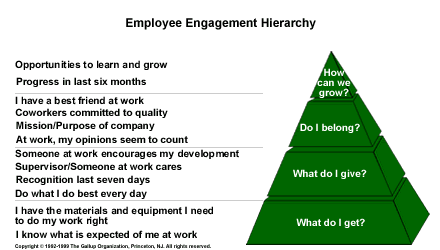School districts seeking to reduce high teacher turnover rates would likely benefit from spending some time in the principal's office. Great principals naturally foster great workplaces, and great workplaces encourage teachers to stay. How do these principals accomplish what seems so far out of reach for many? Great principals set a tone that is likely to boost employee engagement -- the degree to which employees are fully involved in and enthusiastic about their work -- among teachers.
Engagement and Retention
Gallup's exhaustive research on employee engagement shows strong relationships, across industries, between turnover and employee engagement. The manager of the workgroup -- in the case of schools, the principal -- is the individual most able to influence employee engagement levels.
So what do great principals do to create engaged teachers? The 12 question items that make up Gallup's Q12 employee engagement survey were distilled from decades of workplace research to arrive at a set of predictors of business outcomes -- including higher retention. A look at several of the Q12 items, organized according to the qualities that are usually found in great principals (see "Teacher Retention Starts With Great Principals" in Related Items), provides some clues.

Creating a Nurturing Culture
The Q12 survey includes two items that deal with trust and caring in the work culture. Employees are asked the degree to which they agree with the following statements:
-
- "My supervisor, or someone at work, seems to care about me as a person."
-
- "There is someone at work who encourages my development."
When a network of trusting, caring relationships exists in the workplace, employees are more likely to be engaged and stay. As Richard Ingersoll noted in a recent EducationWeek forum, "Teachers report that a major reason for their turnover is 'lack of support from their school administration.'…[Ingersoll's] data do also indicate that school principals vary widely in how well they do support and manage their faculty."
Great principals are able to demonstrate to teachers that they truly care about them, in both subtle and overt ways. When teachers feel cared about, they have far more emotional commitment to their managers and their work. Engaged employees are likely to go "above and beyond" for their managers, while disengaged employees are not.
Providing Resources
That show of support is one of the most fundamental items on Gallup's Q12 survey:
-
- "I have the materials and equipment I need to do my work right."
Providing the resources that teachers need is important to creating a positive work culture. Being denied access to the materials and equipment they need to do their work will likely make talented teachers consider changing jobs. Effective leaders recognize that the money expended to ensure adequate resources will be made up in improved retention. By applying for grants, looking for donations, or marshaling community agencies, great principals realize the importance of equipping teachers with what they need and allowing them to focus on their primary task: teaching.
Develop Teams
Teachers must feel that they are part of a team in order to be engaged:
-
- "At work, my opinions seem to count."
-
- "My associates or fellow employees are committed to doing quality work."
In George Wood's 1993 book, Schools That Work, he quotes veteran teacher Dennis Littky: "The leader, typically the principal, prepares the climate for change. … But by no means does he or she call all the shots or impose his will on everyone. The more people who are involved in coming up with creative solutions to problems, the more good ideas there will be to work with."
Gallup's studies clearly demonstrate that the best principals work hard at developing teams. They understand the importance of working cooperatively with teachers, and ideas are used to persuade, rather than impose authority. Providing a voice to teachers is an important component to these principals' success -- sometimes they are leaders, and at other times they are simply participants.
Next week's column will discuss how important a clear mission, effective recognition, and communication of expectations are to building a positive workplace at school.
The Q12 items are protected by copyright of The Gallup Organization, Princeton, NJ, 1992-1999. All rights reserved.